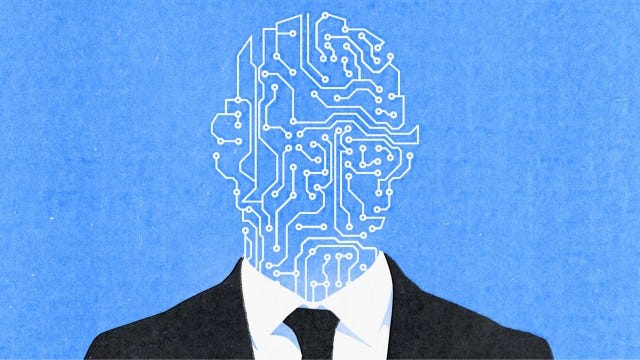Five Things: Germany, Postwar World, Putsch, Female Chip Factory Workers, AI Agents
It's Sunday, again.
Hello and welcome back to Five Things!
Today is the big election day in Germany. After a short and really annoying campaign, we now get to go to the polls.
When I turned 16, I joined the Social Democratic Party of Germany (SPD). My mother ran the county office, my dad was a legislator in the state parliament of Schleswig-Holstein. The leader of the party, Lars Klingbeil, is a good friend of mine, as is the chancellor Olaf Scholz, whom I have known for more than 30 years. Of course I will vote for the SPD this Sunday.
The biggest topic during the campaign was not how we can achieve a better future in the heart of Europe, but rather how we can send illegal immigrants back home quicker. Germany needs about 400,000 immigrants every year to keep the economy afloat. We have a shortage of skilled workers and also a shortage of unskilled workers. We have such a huge problem in the service sector that restaurants and shops close because they don’t have enough people to run the business. We don’t have enough personnel for kindergartens, for hospitals or for retirement homes. Yet when a man, who came from Afghanistan a few years ago, attacked a group of kindergarteners, killing a two-year old and a bystander who wanted to intervene, which is an insane act of violence, all hell broke loose in Germany. Instead of discussing how this could happen, why young men resort to killing others, and how we could integrate people better, how to get them into language courses quicker and into jobs and out of temporary housing, the politicians and the media only talked about one thing: how can we get rid of these people quicker? And then everybody wonders why there is a xenophobic climate in Germany, why high-potentials don’t want to come to Germany anymore, why people of color are avoiding the East, and so on.
We didn’t talk about how to make Germany more resilient against the threats from Russia and from the USA. We didn’t talk about how we can assure the EU can be stronger together. We didn’t talk about the future of our economy, how we can keep a high level of industrialization while also building up other parts of the economy. We didn’t talk about our path to net zero, we didn’t talk about wind and solar power and how we have to improve the grid, we didn’t talk about building more kindergartens and schools, about hiring more teachers, about investing more into our younger generations, and so on. We just planted fear.
Germany hates change, that is nothing new, the population is too old. But this time it feels like people are giving up and want the good old days back, whenever they were. My parents were born in 1941 and 1945 and their stories about growing up after the war in extreme poverty didn’t really sound like the good old days. I grew up during the cold war when Germany was still divided and that also wasn’t the funnest time when hundreds of nuclear warheads were pointed at you. Today, close to one third of the population in Germany has an immigration background. Our society needs to be more diverse and we have to include people who came from other parts in the world. Instead of being delighted that so many people think that Germany is a great place to live and grow a family, Germans are made to believe that this immigration is a problem. It is not. It is our future and we have to embrace it. Not everything will be smooth, there will be setbacks, but we have no alternative.
I sure hope the next electoral campaign will talk about the future again.
In Germany, the Center Can Hold
“A coalition between the CDU/CSU and the SPD is also what German voters prefer over any other outcome, according to recent polling. This shows that despite recent AfD successes, there remains popular support for centrist policies, including increased spending on defense, infrastructure, and innovation by reforming Germany’s so-called debt brake, a constitutional provision to balance the budget. A centrist coalition could also help bolster EU defenses against Chinese production overcapacity, which hurts German and European manufacturing, and attempt to improve relations with the Trump administration. In the end, a Germany aching for stability and reform need not look to new parties but to a familiar and trusted model.” - the downside of a “grand coalition” is that nothing will really move forward. We’ve seen this in the Merkel years, where Germany became complacent and unwilling to change anything. Chancellor Scholz and his coalition overwhelmed people by trying to change too much in to short a time frame, trying to tackle the many crises Germany faces right now.
The End of the Postwar World
“Sometime in the future, historians will wonder what might have been, what kind of peace could have been achieved, if Trump had done what he himself suggested doing a few weeks ago: keep up military aid for Ukraine; tighten sanctions on Russia; bully the aggressors, not their victims, into suing for peace. Perhaps we might also someday find out who or what, exactly, changed his mind, why he chose to follow a policy that seems designed to encourage not just Russia but Russia’s allies in China, Iran, North Korea, Belarus, Cuba, and Venezuela. But now is not the moment to speculate, or to imagine alternate storylines. Now is the moment to recognize the scale of the seismic change unfolding, and to find new ways to live in the world that a very different kind of America is beginning to create.” - what surprises me about Trump’s foreign policy agenda is that policymakers in Europe were not prepared for this. We all knew this would happen, yet Europe once again chose to just wait and see.
How to Organize Our Way Out of the Trump-Musk Putsch
“For the millions of Americans now desperate to reclaim our democracy from the plutocratic vandalism of the second Trump administration, the main challenge before us is simple: We have to unify and fight back. This isn’t new and it isn’t rocket science—the one thing we know from historical fights against authoritarians is that success depends on a persistent, courageous, broad-based, and unified opposition. What that should look like and what that demands of each of us is the heart of the new movement to defeat a more disciplined and lawless Trump White House, but before we get to where we’re going, we have to start with where we are.” - and as the USA is usually a few years ahead before the same developments happen in Germany, we should take note of this handy primer on how stand up against tyranny.
The Women Who Made America’s Microchips and the Children Who Paid for It
“The chemical cocktail is constantly changing in workplaces, and often at a faster rate than scientists can study the potential risks at play. On top of that, companies are often reluctant to share what chemicals they’re using, protecting them as trade secrets. The semiconductor industry’s reassurances are, simply, difficult to verify. In the meantime, Silicon Valley, where it all started, is still cleaning up the mess left behind by the first generation of semiconductor fabs.” - I had never heard about a higher number of misscarriages and birthdefects of newborns among female workers in the chip industry. That’s scary stuff.
AI Agents Will Outmaneuver Salespeople by Optimizing Persuasion
“Of course, human salespeople are interactive and adaptive too. They engage us in friendly dialog to size us up, quickly finding the buttons they can press to sway us. AI agents will make them look like amateurs, able to draw information out of us with such finesse, that it would intimidate a seasoned therapist. And they will use these insights to adjust their conversational tactics in real time, working to persuade us more effectively than any used car salesman.” - so let’s just hope that your AI Agent is better trained than the opposing AI Agent. What a time to be alive.
That’s it. Have a great Sunday! If you missed last Sunday’s edition of Five Things, have a look here:
— Nico







